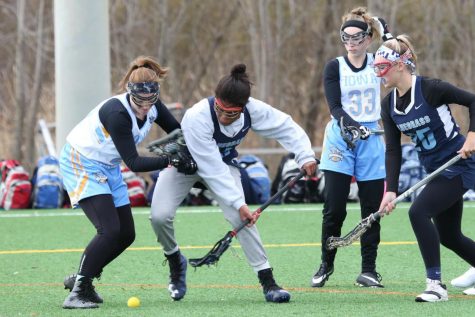Your donation will support the student journalists of Iowa City High School. For 2023, we are trying to update our video and photo studio, purchase new cameras and attend journalism conferences.
The Effects on Juniors
March 19, 2020
Junior year is when the NCAA allows high school athletes to start directly talking to college coaches about potential scholarships. Athletes often use their performance in their junior season to help them find recruiting opportunities.
“Next year’s senior class may be even more affected than this year’s senior class,” Paulsen said. “I think the juniors might see the biggest hit as far as recruiting opportunities, just for the lack of being able to show their performances improve.”
According to Paulsen, a high school athlete generally improves the most between their sophomore and junior year. He thinks this will make it harder for colleges to identify which spring sport athletes they want to recruit, and may reverse the trend towards early commitment.
“We might see a recruiting process next year like we have had in the past where we don’t do as many early signing because we are very uncertain on where the juniors are at,” Paulsen said.
Jason Wakenight, the Assistant Coach and Recruitment Coordinator of the Division 1 University of Iowa Track and Field Team, also described how the missing season may lead to more uncertainty in current juniors’ abilities.
“I think there’s gonna be a little bit more guesswork. It’s not going to be quite as informed and educated of a decision so we’re going to have to look at some intangibles when we decide to sign an athlete because the numbers aren’t gonna be there,” Wakenight said. “We’re just gonna have to use a lot of our experience and background from previous seasons to [decide] who we are going to go after and who we are going to sign.”
For Wakenight, these intangibles include height and body build, which normally factor into a recruiting decision, but will have a bigger impact due to the lack of other statistics. However, past performances at state meets will also remain an important factor, which may be a problem for some juniors.
“I think there’s a lot of kids out there, who were on their way to having a great junior season and actually achieving marks that would have gotten our attention and [now] they’re not going to have that opportunity,” Wakenight said.
Without the times from their junior season, colleges will have to rely on older times from their sophomore seasons until more recent times become available. According to Wakenight, this will make the recruitment process a little trickier but it will still be important for recruiting coaches to not rush with signing athletes, even if it means that they have to wait until later next year.
“We recruit hard every year. So we’re in a position where even if we’re not pulling the trigger and signing a ton of kids next season, I think we have to have the infrastructure in place to have a really, really good program and to move forward as a team,” Wakenight said. “We’re going to be patient. We’re going to take our time and evaluate these athletes. We want to make sure we’re not gonna go out there and make a mistake just because we’re in panic mode.”
This may mean fewer track and field athletes will end up coming to the University of Iowa for recruiting visits next fall, as the college may wait until April or May to sign some athletes from the 2021 class.

Kate Kueter ’21 (left) struggling against an opposing player to get the lacrosse ball as she plays for the Iowa Mavericks.
Other spring sport athletes affected include Kate Kueter ’21. She has played lacrosse since third grade and is now looking at Division II and III colleges to continue her playing career. Her main lacrosse season starts in the spring and continues through the summer.
“My season is basically canceled when it really hasn’t begun yet,” Kueter said. “It is really hard to think about it because you get so little time anyways for coaches and colleges to see you and what you can do. To just cut that time in half is devastating.”
Kueter has been looking at colleges that would be a good fit for her since sophomore year, but due to NCAA regulations, she was not able to directly communicate with the coaches about recruiting her.
“Lacrosse has just been such a big part of my life since such a young age that I can’t really imagine not having lacrosse in it. College would be that last chance I would get to be in lacrosse,” Kueter said.